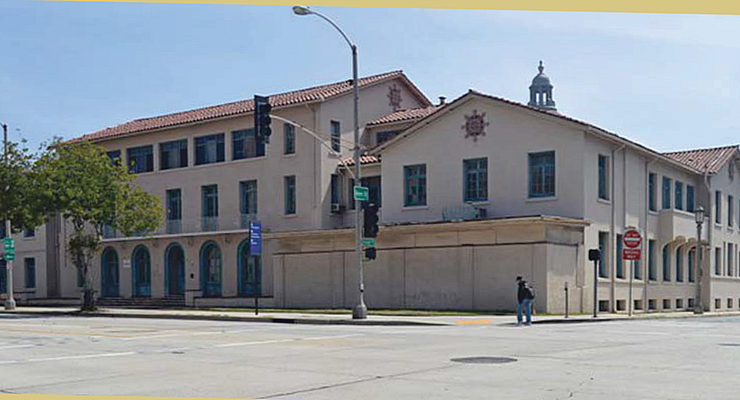
The City Council on Monday voted to declare an empty Water and Power Department lot on Ramona Street and the famed Julia Morgan YWCA building as surplus property.
The move clears the way for the city to sell or lease those properties.
“The city of Pasadena is negotiating in good faith with certain developers regarding the disposition and development of the properties … including rehabilitation of the historic YWCA building,” states a staff report on the issue.
“Prior to disposing of the properties, either through a long-term lease or sale, the City Council must declare them to be surplus land under state law. State law defines surplus land as land that is not necessary for the city’s use.”
The council’s move comes after a Planning Commission vote on surplus property declarations failed. At that meeting, commissioners said they were concerned about a lack of control over potential future development that might occur on the properties and the inability to make the finding without a specific project proposal.
Housing activists and local residents have been calling for an affordable housing project at the site of the YWCA for several years.
During a Sept. 22 virtual meeting, several developers presented 15 proposals to the public.
“I know how long the city has struggled with the usage of these sites,” said former Pasadena Mayor Rick Cole in correspondence to the city. “My hope is that the city can act promptly on the recommended action and choose from the three excellent proposals for affordable housing development and see their completion as soon as possible. This is an overdue opportunity to provide much-needed affordable housing, add to the vitality of the urban core and architecturally enhance the Civic Center with a well designed new building.”
The notification is required under the Surplus Land Act (SLA), which went into effect on Jan. 1.
However, the law — which mandates the city to first offer available land to developers looking to build units that are considered affordable — may have hampered the city’s ability to move forward with developers that had already submitted proposals.
Under the conditions of the SLA, developers must commit to setting aside 25 percent of the units for affordable housing.
“As a person of faith I believe that housing those who are low income and homeless not only benefits our city, it is also a blessing,” said affordable housing advocate Anthony Manousos.
In 2012, the city issued a request for proposal (RFP) to identify potential developers that would propose a project that would rehabilitate the building, which included the potential to develop adjacent properties in a manner consistent with the Central District Specific Plan.
In 2013, the city entered into an exclusive negotiation agreement with Kimpton Hotel & Restaurant Group, LLC for the development of a hotel project on the site.
The plan was eventually scrapped when the developer asked for a $30 million subsidy to help cover increasing costs on the project. If it had been approved, the subsidy would have provided the developer with decades of free rent and parking.
Preservationists and housing activists decried the project.
After years of decline, in 2003 the city began the process of acquiring the historic YWCA building to stop further deterioration and ensure its future rehabilitation.
After years of unsuccessful negotiations with the owner and the continued decline of the building, the City Council authorized eminent domain action in 2010 to acquire the building for the preservation of a historic asset.
Rather than continue with eminent domain action, both parties agreed to mediation which culminated in a court-approved stipulation agreement which gave the city ownership in April 2012. The city paid $8.3 million for the land.
The former owner of the property has claimed the city has lost its rights to retain the YWCA building because city officials did not put the building into public use within the 10-year window required under the law, and did not reauthorize its use.
The site was designed by famed architect Julia Morgan. Morgan was the first woman admitted to the architecture program at the École des Beaux-Arts in Paris. She designed the YWCA building in the early 1920s. The building was completed in 1923.
Morgan arrived in Paris in 1896 to attend the École des Beaux-Arts, the most respected architecture school in the world. Up until that point, no woman had gained admittance into the school. The diminutive Morgan, who designed Hearst Castle for publishing tycoon William Randolph Hearst starting in 1919, took the entrance exam three times before she was admitted in 1898.
City officials previously told Pasadena Now that the former property owner’s assertions have been looked into and it was concluded that the city is in compliance with applicable laws, and did not have to offer to sell the property to the former property owners.
“The need for affordable housing continues to increase due to the pandemic and economic downturn,” said Pasadena resident Gloria Newton. “And we as citizens and city leaders must act quickly to move forward on all projects that will help to address this process.”














 0 comments
0 comments


